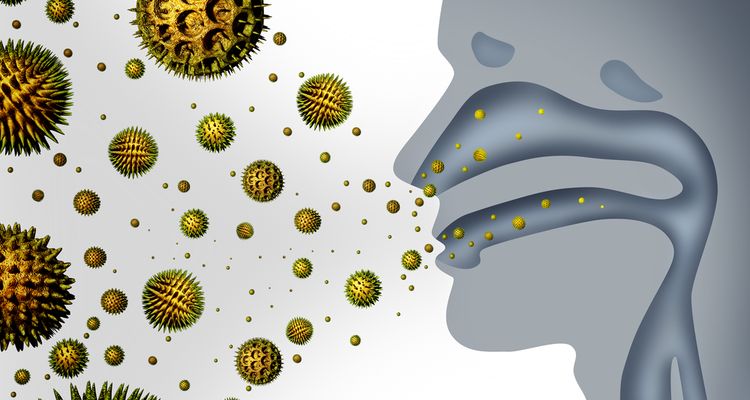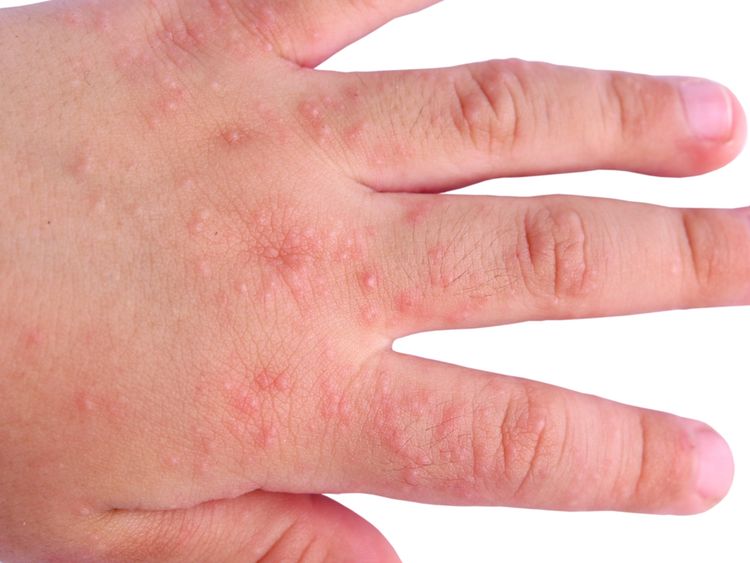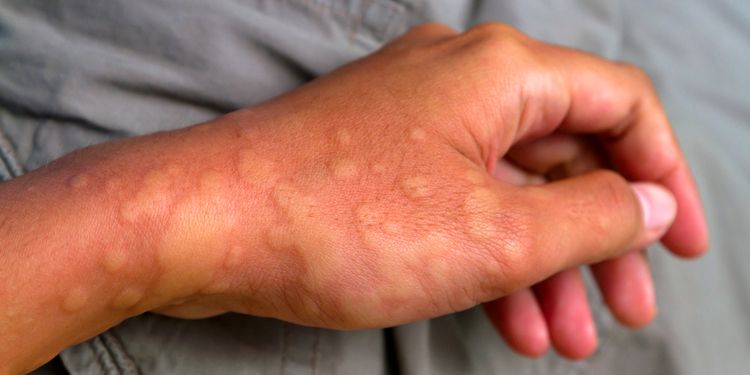How To Discover The Root Cause of Your Allergies

Are itchy eyes, a runny nose, sneezing, wheezing, itchy skin, rashes, hives, and red or blistered skin a part of your reality? If so, you could be having a reaction to an allergen. Did you also know that itchy lips or a tingly throat, stomach cramps, diarrhea, or difficulty swallowing could be signs of an allergy as well?
According to the American College of Allergy, Asthma, and Immunology, over 50 million Americans suffer from allergies of some kind, and allergic diseases are the 5th most common chronic disease in the United States.1 Allergic diseases include atopic dermatitis, allergic rhinitis, asthma, food/drug/insect allergies, urticaria (hives), and angioedema (swelling beneath the skin).
Recent research reported that having one allergic disorder significantly increases the risk of developing other allergic disorders.2 If you’re one of these people, it may be comforting to know that you’re not alone, but understanding what causes these allergies may eliminate or alleviate your symptoms.

What Exactly are Allergies?
Allergies are considered an atopic condition where individuals have a tendency to develop hypersensitive responses. Common inhaled allergens include pollen, animal dander, dust, and mold. Ingested allergens include medications and any food—most commonly wheat, dairy, eggs, peanuts, tree nuts, soy, and shellfish. Nickel, copper, latex, and insect stings are allergens that enter through the skin.3
Reactions can affect the airways (wheezing, coughing, difficulty breathing, shortness of breath), gastrointestinal tract (stomach cramps, vomiting, diarrhea), circulatory system (redness, swelling, and anaphylaxis), and skin (hives, rashes, swelling). Allergies can also cause symptoms in the nasal passages (itchy, stuffy, and/or runny nose and postnasal drip), mouth (tingling, swelling, and itching in the mouth, lips, or throat), and eyes (swollen, red, itchy eyes). Symptoms can occur within minutes to days and can range from mild to severe.
Allergies can affect anyone, regardless of age, gender, or race. In general, allergies are more common in children; however, a first-time occurrence can happen at any age or may come back after years of remission.4
How Do Allergies Occur?
Allergies occur when the immune system has an exaggerated or heightened response to a substance that’s otherwise harmless. There may be a genetic component to the hypersensitivity response; individuals with family members who have other atopic conditions, including allergies, asthma, and dermatitis, as well as autoimmune conditions, tend to have a greater chance of developing allergies.
One of the primary functions of your immune system is to protect you from invading microorganisms and foreign substances by making antibodies that fight off bacteria, viruses, fungi, and other harmful pathogens called antigens.5 Antigens are the proteins on the foreign invader that the immune system makes a corresponding antibody for. Under normal circumstances, substances enter your body without any problems, but for people with allergies, those same substances (called allergens) enter your immune system and are identified as antigens, so you produce antibodies.
The response induced from your immune system causes an inflammatory reaction that can provoke symptoms in the nose, lungs, throat, sinuses, ears, stomach lining, and skin.5 The symptoms can vary depending on the type and amount of the allergen, as well as how your body reacts. When you’re exposed to a specific allergen that your body has identified as an antigen, subsequent exposure to the same allergen results in an allergic reaction.

Symptoms of Allergies
Allergy symptoms vary from person to person. Some of the first signs could be a stuffy or runny nose, itchy skin, or tingling in the lips, tongue, and/or throat. Other signs include:6
- tight, hoarse throat
- wheezing or shortness of breath
- sneezing
- coughing
- hives
- swelling
- rash
- nausea and/or vomiting
- stomach cramps
- diarrhea
For some people, allergy symptoms are just annoying. For others, allergies can be a life-threatening occurrence by causing anaphylaxis, a condition marked by respiratory distress, swelling of the larynx, rapid heart rate, a drop in blood pressure, and sometimes cardiac arrest.7
Types of Allergies

There are two main types of allergic reactions are immediate hypersensitivity reactions, which occur within minutes of contact with allergen, and delayed hypersensitivity reactions, which can occur hours or days after exposure.
Immediate hypersensitivity reactions (Type I) usually involve inhaled or ingested allergens and can manifest through the skin (urticaria/hives, dermatitis, and eczema), eyes (conjunctivitis), nose (rhinitis), lungs (asthma), or GI tract. The reaction takes about 15-30 minutes from the time of exposure, but it may have a delayed onset of up to 10-12 hours and can last several hours following contact. Type I reactions may cause an array of symptoms, from a minor inconvenience to death.
Delayed hypersensitivity reactions (Type IV) tend to enter through the skin (nickel, latex, poison ivy, poison oak, or sumac). The reaction takes about 48-72 hours following contact, and symptoms and can last up to a week or more. Type IV reactions involve the skin, including symptoms like itchy hives, rashes, and swelling.
The most common allergies are:
Allergic asthma is a chronic lung disease that occurs when the the airways become inflamed and narrow, making it difficult to breathe. People with asthma may also have allergic rhinitis. Asthma is triggered by inhaling allergens like dust mites, pet dander, pollen, and mold. Symptoms include coughing, tightness in the chest, shortness of breath, and wheezing.8
Allergic rhinitis, also known as hay fever, may be seasonal or year-round and occurs when you’re exposed to airborne allergens. Rhinitis may be caused by indoor allergens (dust mites, pet hair or dander, cockroaches, or mold), outdoor allergens (pollen and mold), and other irritants (smoke, chemicals, or pollution). Rhinitis can sometimes trigger sinusitis (swelling of the sinuses) and otitis media (ear infections). Symptoms include sneezing, cough, stuffy or runny nose, and itchy nose, eyes, roof of mouth, and/or ears.9
Allergic conjunctivitis is inflammation of the eyes due to a reaction to an allergen. It’s associated with red, itchy, swollen eyes. The most common cause is rhinitis due to pollen, dander, or mold.10

Urticaria, also known as hives, are itchy, white bumps surrounded by red, inflamed skin. Acute urticaria is triggered by foods (especially peanuts, eggs, nuts, and shellfish), medications, latex, or insect bites. Chronic urticaria doesn’t have an identifiable cause and may last months or years.11
Angioedema is swelling of the tissue beneath the surface of the skin. It’s similar to hives, but the swelling is under the skin as opposed to on the skin, although it’s often seen with urticaria. It’s caused by an allergic reaction to foods, medications, insect bites, animal dander, and pollen. The swelling usually occurs around the lips and eyes but may also be found on the hands, feet, and throat.12
Allergic contact dermatitis occurs when your skin comes in contact with a substance that causes an allergic reaction. Common allergens include nickel, latex, chemicals, and poison ivy, oak, or sumac. Itching is the main symptom of allergic dermatitis. There may be red streaks or a rash where the substance has touched the skin, and the reaction is often delayed and so may not appear until 24-48 hours after exposure. 13
Drug allergies affect any part of the body and can cause a skin rash or hives, itching, wheezing or other breathing problems, swelling, vomiting, and anaphylaxis. Drugs connected with allergies include penicillin and related antibiotics, sulfa-containing antibiotics, anticonvulsants, aspirin, ibuprofen, and other non-steroidal anti-inflammatory drugs (NSAIDS).14
Food allergies are an allergic reaction to foods, the most common of which are dairy, eggs, wheat, soy, corn, and tree nuts.* Symptoms range from mild to severe and can start within minutes of contact or be delayed up to six hours. Symptoms can involve the skin, gastrointestinal tract, cardiovascular system, and respiratory tract. Symptoms include vomiting and/or stomach cramps, hives, shortness of breath, wheezing, coughing, hoarse throat and/or trouble swallowing, dizziness, and when severe, anaphylaxis.15
*It’s important to note that food sensitivities are sometimes called allergies but aren’t true allergies. Food sensitivities generally represent a blockage in a metabolic pathway that prevents the normal metabolism of some component of the food, resulting in uncomfortable symptoms. The most common intolerances are lactose, tyramine, preservatives and additives, and gluten.

Root Causes of Allergies
Allergies result from underlying dysfunctions, which can include:
Leaky gut: Lifestyle factors such as poor diet, lack of exercise, lack of sleep, stress, and excessive alcohol and/or sugar consumption can result in leaky gut, which can cause digestive issues, asthma, allergies, hormone imbalances, skin issues, food allergies, and autoimmune diseases.
Hormone imbalances: The body’s hormones and the immune system use many of the same chemical messengers. Thus, changes in individual components can affect the rest of the body; when hormones are imbalanced, the immune system can become impaired, making you more prone to allergies.
Dysbiosis: The intestinal microbiota plays an important role in the immune system. Alterations in the gastrointestinal tract affect inflammation and metabolic responses, increasing your risk of developing allergies.
Malnutrition: Good nutrition is necessary for proper immune function; dietary deficiencies are associated with immune dysfunction. Impaired immune function reduces immunodeficiency (the body’s ability to respond to pathogenic organisms), which opens your body up for infections, disease, and increased susceptibility to allergies.
Stress: Stress also creates immune dysfunction. Prolonged stress changes the immune system’s ability to respond quickly and affects how we heal. Our body reacts to stress by increasing the stress hormone cortisol. Increased cortisol suppresses immunity by turning off the inflammatory response to infection, increasing susceptibility to illness and the tendency to develop allergies and gastrointestinal issues.

Dysbiosis
Dysbiosis is an imbalance between beneficial and harmful species of bacteria in your gut that can contribute to the development of food allergies. In a healthy person, there are predominantly more friendly bacteria in the digestive tract. When there’s an overgrowth of unfriendly bacteria, a state of dysbiosis occurs.
Dysbiosis can be caused by parasites, yeast, or bacteria. The overuse of prescription antibiotic drugs can kill both the good and bad bacteria, leaving the intestines vulnerable to pathogenic invaders. Maldigestion can also promote dysbiosis. A diet high in refined carbohydrates and sugar can cause an overgrowth of candida, a type of yeast that lives off of sugar.
All of these factors (parasites, yeast, bacteria, antibiotics, maldigestion, and poor diet) can cause a shift in bowel flora. When the microbiome of the gut is altered, it activates the inflammatory pathways in your body, weakening your immune system and putting you at risk for developing allergies and other inflammatory conditions.
Leaky Gut
Leaky gut is associated with increased intestinal permeability, inflammatory conditions like IBS, Celiac disease, food allergies and intolerances, and skin conditions like eczema, urticaria, and psoriasis. The epithelial lining of the intestinal tract is covered with villi, small finger-like projections of tissue that increase the surface area of the gut. These villi have the job of helping with nutrient absorption. The tight junctions (in the space between the cells) of the villi are what keep the bad stuff (large proteins, bacteria, viruses, fungi, and other harmful pathogens) out and allow the good stuff (essential nutrients) in.
In a leaky gut, the villi wear down, the intestinal cells become permeable, and the tight junctions are broken down. Thus, these enlarged spaces allow bigger than normal molecules to get through. These molecules go directly into your bloodstream, which isn’t where they should be, and your immune system sees them as foreign invaders and creates antibodies that can potentially cause reactions every time you come in contact with those substances again.
Causes of a leaky gut include stress, nutritional deficiencies, intestinal bacterial infections or overgrowth, excessive sugar consumption, food allergies, chronic use of medications (especially antibiotics and anti-inflammatory drugs), and alcohol consumption.
Hormone Imbalance
Hormone fluctuations can significantly impact allergies and allergy symptoms. Changes in hormone levels can cause a decrease in pulmonary function and are often associated with the development of allergies, particularly rhinitis, asthma, and dermatitis.27 Before puberty, the prevalence of asthma is greater in boys than girls; however, after puberty both prevalence and severity in adult women is higher than in men.28,29
Female hormones (estrogen and progesterone) appear to have an important role in allergic diseases. Estrogens have both pro-inflammatory and anti-inflammatory properties, while progesterone exhibits anti-inflammatory activity. Losing either of these sex hormones can lead to increased inflammation, compounding allergic conditions.
Shifts in the balance of estrogen and progesterone coincide with inflammatory conditions during menopause. For premenopausal women, the body is preparing to discontinue menstruation.
At the same time, estrogen and progesterone begin to decrease. When progesterone decreases at an accelerated rate (compared to estrogen), the body has little or no progesterone to balance the estrogen and this results in excess estrogen, or estrogen dominance. Estrogen dominance promotes histamine release, which causes allergy symptoms.
You don’t even have to be a woman (or be going through menopause) to experience estrogen dominance. Dr. Ronald Hoffman notes that environmental estrogens (xenoestrogens), poor diet, obesity, and a lack of exercise can also cause this imbalance.30
Xenoestrogens that contribute to estrogen dominance include pesticides, chemicals, and plastics. Symptoms include sinus problems, headaches, asthma, skin conditions, and cold intolerance.

Stress
Stress is defined as any event that poses a threat. Stressors can be physical (trauma, injury, infection, exercise), psychological (anxiety, depression, major life events, daily hassles in life), chemical (environmental toxins, medications, diet, recreational drugs), or any combination of the three.34
Stress induces an increase in specific hormones produced by the adrenal glands, which raises your blood pressure, increases your heart rate, and suppresses your immune system. Over time, the changes caused by adrenal fatigue can disrupt the balance of microflora in the gut, creating a compromised immune system that immobilizes your ability to fight off foreign invaders (like allergens).
Chris Kresser points out that blood flow to the digestive tract also decreases, causing digestive problems such as gastroesophageal reflux disease, irritable bowel, and food allergies.35 Adrenal hormones also increase the blood’s clotting ability, which may contribute to arterial plaque formation and heart disease.
Nutrition deficiencies, toxicities, and lifestyle habits such as lack of sleep and lack of exercise can impact the adrenal glands, as well as the balance of sex hormones.36

Malnutrition
Malnutrition can lead to nutrient deficiencies that can undermine proper immune function. Diets low in nutrient-rich foods can impair your immune response and increase your susceptibility to infection and illness. Nutrients such as vitamin C, magnesium, and zinc play an important role in regulating body chemistry. An imbalance of these essential nutrients can cause metabolic dysfunctions, including allergies.
Toxic metals like lead, mercury, and cadmium can also cause allergies by replacing vital nutrients the body needs for immune defense. Additives, preservatives, artificial flavorings and colorings, and pesticides in our food can alter our body chemistry in a negative way.
Lack of fresh fruits and vegetables (which provide flavonoids, antioxidants, and fiber) can increase cell permeability, allowing vital nutrients to leak from the cells and toxins to pass into them.31,32
Diets high in refined starches and sugar and low in fruits, vegetables, whole grains, and omega-3 fatty acids can activate inflammation in the immune system, leading to allergies. Poor nutrition can also cause obesity, which contributes to constant, low-grade inflammation throughout the entire body.
Dr. Hyman sums it up by saying that the standard American diet (SAD) is “energy dense (too many calories) but nutrient poor (not enough vitamins and minerals).”33

Natural Relief from Allergies
Preventing the symptoms of allergies involves avoiding known triggers, such as animal dander, particular foods, latex, etc. Unfortunately, avoiding some allergens like mold, pollen, and insect stings can prove difficult. However, there are some natural remedies that may help alleviate your symptoms, such as:
Probiotics: Probiotics are live microorganisms, also known as “good bacteria,” that help maintain the natural balance in the gut. They’re vital for a healthy immune system because they protect you from disease-causing microorganisms and aid in the digestion and absorption of nutrients.16 Yogurt is the most common food containing beneficial bacteria, but probiotics are found in all fermented foods, including pickles, kvass, miso, tempeh, and sauerkraut.
Vitamin D: This vitamin enhances the activity and response of white blood cells, which gives a boost to the immune system. It has also been shown to modulate inflammatory responses, enhance antimicrobial peptide activity, and promote the integrity of the permeable barrier of the skin.17 Vitamin D can be found in small amounts in a few foods, including fatty fish such as salmon, herring, mackerel, sardines, and tuna, but most of what the body gets is obtained through sun exposure.
Vitamin E: Vitamin E is an important fat-soluble antioxidant that acts as a free-radical scavenger. Research suggests that vitamin E inhibits the activation of neutrophils, the cells that contribute to respiratory inflammation in asthmatics.18 Vitamin E can be found in sunflower seeds, almonds, avocados, and spinach, to name a few.
Vitamin C: Vitamin C plays an important role in the body’s ability to handle physical stress during infection, injury, or chronic disease. It’s also an important water-soluble molecule that helps protect against oxidation by free radicals. Vitamin C has antihistamine properties that can help relieve allergy symptoms.19 It can be found in things like papaya, broccoli, kale, and cauliflower.
Magnesium: Magnesium is utilized by every cell in the body and participates in energy metabolism and protein synthesis. Magnesium plays an essential role in over 300 enzymatic processes within the body. Evidence from studies indicates that magnesium modulates the immune response; deficiency can lead to increased inflammation.20 Magnesium can be found in cacao, fish, avocados, and spinach.

Omega-3 fatty acids: All seafood contains the omega-3 fatty acids docosahexaenoic acid (DHA) and eicosapentaenoic acid (EPA). These fats have anti-inflammatory and antithrombotic (anti-clotting) effects.21 Lower levels of omega-3 fatty acids are associated with delayed hypersensitive skin reactions.22 Good sources include fish, oysters, and pastured egg yolks.
Quercetin: Quercetin, one of the most common flavonoids found in a variety of foods such as red wine, green tea, and apples, has been studied for its ability to reduce the symptoms of allergies. It’s an antioxidant shown to inhibit lipid peroxidation and reduce inflammation, and it has anti-allergy properties, making it a useful treatment for allergies.23
Stinging nettles: Urtica dioica’s main use is as an anti-inflammatory. Nettles also have antioxidant properties, as they’re shown to scavenge free radicals. They’re known to be an effective therapy for allergic rhinitis.24
Diet: An anti-inflammatory diet (high in vegetables, seasonal fruit, pastured meats, seafood, and healthy fat, and low in processed and refined foods) can help reduce the symptoms and severity of inflammation caused by allergies.
For allergic rhinitis, Dr. Weil recommends eliminating carpets and curtains, which can trap dust mites, and using an air filter to remove particles in the air.25 In addition, Dr. Gottfried suggests using a Neti pot to clear away irritants in your sinuses.26
As you can see, there are many measures you can take to relieve your allergy symptoms. Adopting smart lifestyle and dietary habits are the first steps toward an overall healthy existence. From there, give the aforementioned natural relief options a fair shot, and I’m confident you’ll be feeling much better in no time.
